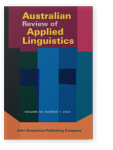Vol. 46:1 (2023) ► pp.99–123
Pseudo-compliance or convergence?
Content teachers work together to learn about language
This paper reports on a professional learning (PL) project conducted over one year at a senior secondary school in New Zealand. Subject teachers volunteered to work with one another and a facilitator to identify the linguistic demands of their subjects, adapt teaching materials, and try out teaching approaches congruent with research evidence about teaching emergent bilingual (EB) learners. This paper explores cases of subject-specific partnerships and how participants’ responses to the PL appeared to impact their existing pedagogical content knowledge (PCK). The PL sessions were facilitated through audio-recorded Zoom meetings. A thematic analysis was conducted, and the findings were analysed using an adaptation of Davison’s (2006) framework to map how participants engaged with the PL and collaborated with one another on new pedagogies. The study suggests that these teachers accommodated linguistic teaching approaches, but their adaptation to language PCK may have remained at a compliant level.
Article outline
- 1.Background
- 2.Literature review: Knowing how to teach language and subject matter
- 2.1Pedagogical content knowledge
- 2.2Dual teaching approaches
- 2.3Conceptions of teaching language and content
- 3.Methods
- 3.1Research design
- 3.2Combining PL and research
- 3.3Data collection
- 3.4Data analysis
- 3.5Trustworthiness
- 4.Findings
- 5.Discussion and implications
- 5.1Attitudes towards the PL and integration of PL going forward
- 5.1.1Using the language of language
- 5.1.2Teaching language or teaching content?
- 5.1.3Planning opportunities for students to talk
- 5.1.4Simplifying or amplifying?
- 5.2Teachers’ efforts to engage with each other
- 5.1Attitudes towards the PL and integration of PL going forward
- 6.Limitations
- 7.Conclusion
-
References
